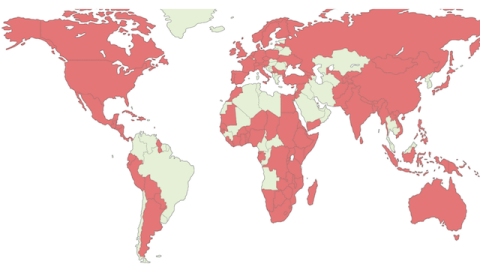Government-By-Nudge Is a Global Phenomenon

Nudges, “choice architecture,” social marketing and other non-rational approaches to government are a pretty significant development. After all, these policies replace explicit arguments (“you should get more exercise for these reasons”) with hidden persuasion (“in our next building, let’s hide the elevator and make the stairs really prominent?”). That’s a major change for any democracy. Yet many people are unimpressed, because they think of these policies as a pack of First World Problems. We in the rich world hear of these policies when they’re put in place to prompt us to eat less, exercise more, save money for retirement and otherwise act sensibly. How privileged we are to worry about such things, when people in less prosperous countries face beheadings, plane crashes, Ebola or the arrival of jackbooted thugs at 2 a.m. You might think most governments have more pressing things to do than use behavioral research to get citizens to become an organ donor. But if you think that, you are wrong, as this study reveals (pdf). Its authors found non-rational approaches to persuasion are now in use in a large majority of nations—rich, middling and poor.
“Nudge,” according to Mark Whitehead, a geographer at Aberystwyth University in Wales, and his co-authors Rhys Jones, Rachel Howell, Rachel Lilley and Jessica Pykett, “is more global than you expect.” Out of 196 nation-states, they found, there are 136 in which non-rational approaches to behavior change are used. And in 51 nations, including China, the United States, Australia, and countries in west and east Africa and in western Europe, the the behavioral approach is being directed by some nationwide centralized authority.
These behavioral approaches range from social marketing to promote practices that prevent the spread of HIV (China), to banks texting customers to remind them to save (Peru), to nudging malaria-prevention behavior (Africa) and basic hand-washing hygiene (many places, including the U.S.).
Whitehead et al. considered a policy to be influenced by behavioral theories if it involves one of three basic strategies. A policy might change the frame in which information is presented (for instance, an electric utility that tells customers how they compared to their neighbors in power use). Or a policy invokes social pressure (Burkina Faso’s hand-washing initiative was light on hygiene facts and heavy on the merits of being attractive and respectable.) The third category covers policies that redesign physical structures, forms, or experiences, to incline people toward one choice over others (as in the famous behavioral-policy example of switching organ-donation forms from opt-in to opt-out).
In the English-speaking world, the spread of nudge is often depicted as top-down. Prime Minister David Cameron of the United Kingdom was much taken with the behavioral approach, for instance. So was Barack Obama, who appointed his friend Cass Sunstein to head the White House clearinghouse on Federal regulations. However, in other nations, Whitehead et al. find, the spread of behavioral approaches is being driven by groups, not politicians. Their report supplies a long list of Non-Governmental Organizations who promote nudge and similar policies in Africa and other places where they combat disease, violence, poverty and other ills. Moreover, the corporate world (always interested in marketing anyway) is also involved. Many corporations, the report says, promote behavior change methods as a way of promoting their social responsibility and enhancing their brands.
The research is part of an ongoing project by the group, aimed at tracking and understanding the rise of the sort of government they call, in a nice turn of phrase, “the psychological state.” Their approach is refreshingly unlike the usual debates over these policies, in which the ideas are attacked as a menace or celebrated as efficient and harmless tweaks to business as usual. Whitehead and his colleagues recognize that insights from psychology can offer people new ways to change their behavior, which might work better than the old rationalist strategies. At the same time, Whitehead et al. also recognize that these techniques give elites powerful tools for manipulating non-elites. Why use the insights of psychology only to get “them” (poor people, obese people, unemployed people etc) to change? Why not offer “them” insights into behavior and let them decide for themselves how to change?
Part of the group’s work, then, is to track how, why and when the elites took up psychological approaches to government. That led them to map the extent to which these sorts of policies are in place already, all over the world. Hence this report, which establishes that nudges and other forms of nonrational persuasion are truly a global phenomenon.
Illustration: Nations in which at least some public policies are informed by “nudge” or other post-rational insights into behavior change. Source: Nudging all Over the World, Whitehead et al.
Follow me on Twitter: @davidberreby





